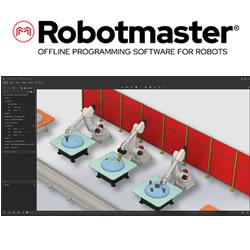Cobot Opens Seattle Office, Hires Foundation Models AI Leader
Company Launches New Foundation Models AI Team, Partners with University of Washington for Robotics Research, and Opens Seattle Office
Collaborative Robotics (Cobot), a leader in the development of practical collaborative robots (cobots), today announced an advancement in its AI research capabilities with the establishment of a new Foundation Models AI team. The initiative marks a significant milestone in Cobot's strategic expansion and is led by Michael Vogelsong, a founder of Amazon's Deep Learning Tech team, who recently joined Cobot. Cobot also announced it has opened a new Seattle office, which will be the base for the AI team, and a research grant to Professor Sidd Srinivasa at the University of Washington to support advanced AI research. The announcements follow the company's recent $100 million Series B financing round led by General Catalyst.
"Our cobots are already doing meaningful work in production on behalf of our customers. Our investment in building a dedicated foundation models AI team for robotics represents a significant step forward as we continue to increase the collaborative potential of our cobots," said Brad Porter, CEO of Cobot. "The foundation models AI team will explore the cutting-edge possibilities of AI in enhancing robotic capabilities, particularly in the area of bimanual manipulation and low-latency multimodal models. We aim to achieve a new level of comprehension and control in our robots, enabling them to understand and respond effectively to complex tasks and environments. I am looking forward to seeing the innovations this talented team creates."
The new Foundation Models AI team will concentrate on integrating advanced machine learning techniques into Cobot's production robots. By combining existing foundation models, novel research, and strategic partnerships with the practical experience from running cobots live in production environments, the team aims to improve the adaptability and precision of robotic tasks. Building on Cobot's earlier work in developing an Auditable Control and Planning Framework (ACoP), this research will explore how models that process text, vision, and actions can interact and create a real-time feedback loop for adaptive control.
As part of its commitment to advancing AI research, Cobot is also funding PhD work at the University of Washington through a significant gift. This gift will sponsor the research of Professor Sidd Srinivasa, an academic leader in AI and robotics, who also serves as an advisor to Cobot.
"The collaboration with Cobot supports our ongoing research at the University of Washington," said Professor Sidd Srinivasa. "Cobot's commitment to advancing AI and robotics aligns well with our research goals and will help us advance robotic capabilities across multiple dimensions and particularly in the area of bimanual manipulation. "
Cobot's new Seattle office, opening this month, will serve as a hub for these advanced research activities. Seattle's thriving tech ecosystem and rich talent pool provide an ideal environment for Cobot's expanding team and research goals.
About Cobot
Collaborative Robotics (Cobot) was founded in 2022 by Brad Porter, former VP of Robotics and Distinguished Engineer at Amazon, with the vision to create a world where trustworthy cobots seamlessly integrate into all areas of useful work, from manufacturing, logistics, healthcare, municipal services, and more. With a focus on trustworthiness, adaptability, and real-world usefulness, Cobot is committed to developing robotics solutions to drive positive change for a better world. Collaborative Robotics is based in Santa Clara, California, and backed by General Catalyst, Sequoia Capital, Khosla Ventures, Mayo Clinic, Lux Capital, and more. To learn more please visit co.bot and follow us on LinkedIn.
Featured Product

